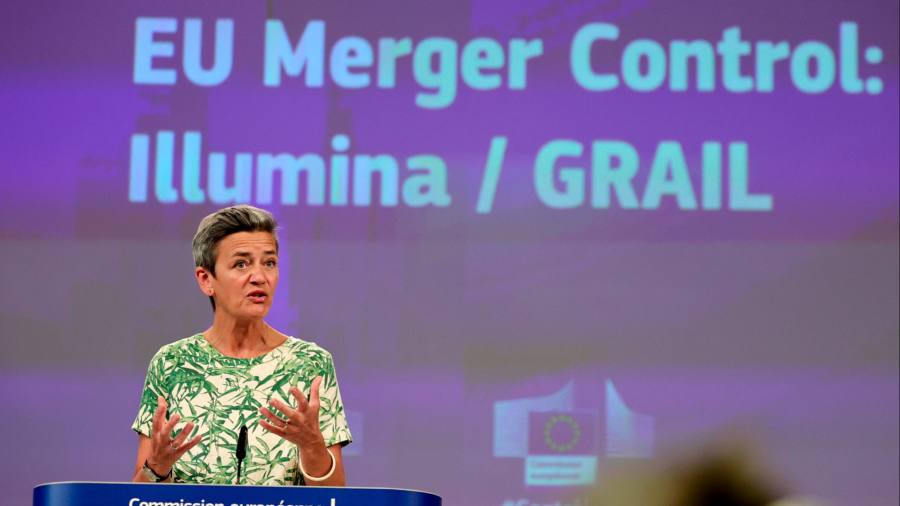Brussels has accused Illumina of using “delay tactics” to prevent a speedy ruling on whether the world’s biggest gene sequencing company should be forced to divest cancer test developer Grail.
It follows repeated claims by Illumina that it is moving as “expeditiously as possible” to resolve litigation linked to its $8bn acquisition of Grail, which is the focus of a bruising proxy battle waged by Carl Icahn, the veteran activist investor.
A delay could lead to months of waiting for an outcome while investors are seeking certainty over the future of Grail. US antitrust regulators also ordered Grail’s divestiture in April, a decision Illumina is appealing against.
EU antitrust authorities blocked the deal in September over concerns that it could harm competition, after the company closed the transaction without regulatory approval.
Illumina subsequently appealed against the decision and opposed an application from Brussels to get an expedited final ruling on whether it should get rid of Grail, according to four people with direct knowledge of the matter.
The fast-track procedure allows judges in Luxembourg to quickly rule on the substance of a legal battle in cases that are considered urgent.
“Illumina doesn’t want a fast process in court, they are playing delay tactics,” alleged a person with direct knowledge of the EU’s position.
“The way Illumina is behaving contradicts its claim that it wants to solve the issue fast,” the person added.
While the company is exercising its full legal rights to defend itself, any delay could buy time to sell Grail at better market value, said a person familiar with the company’s strategy.
Illumina has also appealed against a decision by the European Commission to scrutinise the case despite Grail having no revenues in Europe. That case will be decided by the Court of Justice.
Assimakis Komninos, a partner at law firm White & Case, and who is not involved in either Illumina case, said: “It makes sense for Illumina to wait because if it wins before the Court of Justice on a separate ruling on whether the EU has jurisdiction in the case at all, everything will collapse like a domino effect.”
The European Commission declined to comment.
Illumina responded: “We are pleased the General Court granted priority treatment to our appeal, as we share the [European Commission’s] goal of resolving the case quickly. However, unlike in the US appeal where expedited treatment ensures full briefing by both sides, here, the EC’s request for expedited treatment was entirely one-sided
“The EC’s request would have unfairly deprived us of any ability to respond in writing to the EC’s extensive arguments on appeal and would have also deprived the intervenors of any ability to present their views in writing, thus limiting their ability to participate in the proceedings.”
The revelations come after Icahn launched one of the biggest proxy battles in years over what he described as the company’s “reckless” acquisition of Grail.
Illumina shareholders ousted the company’s chair, John Thompson, in a vote at its annual meeting on Thursday, which enabled Andrew Teno, a nominee proposed by Icahn, to win a board seat.
Two other Icahn nominees failed to attract enough votes to win board seats, paving the way for Illumina chief executive Francis deSouza and director Robert Epstein to be re-elected.
Analysts said the vote to oust Thompson reflected shareholders’ desire for Illumina to expedite the legal process around the Grail acquisition and divest the company.
“We think Illumina’s board of directors has heard the message loud and clear, and we would be curious to see how messaging on Grail changes going forward,” said Vijay Kumar, analyst at Evercore ISI.
Read the full article here




